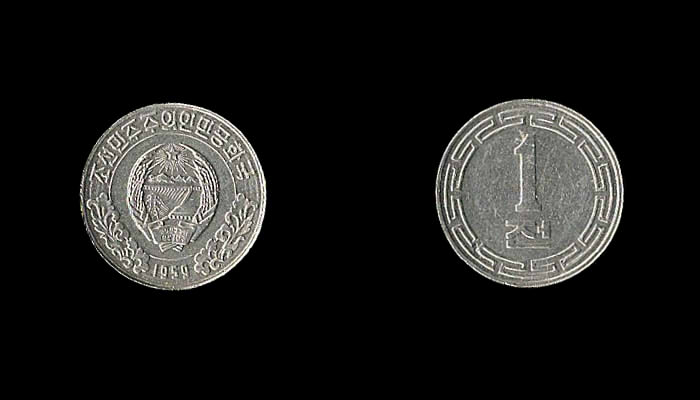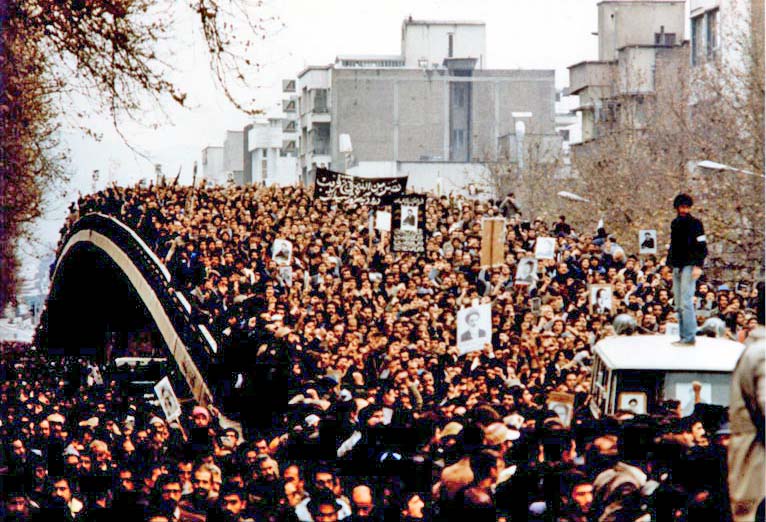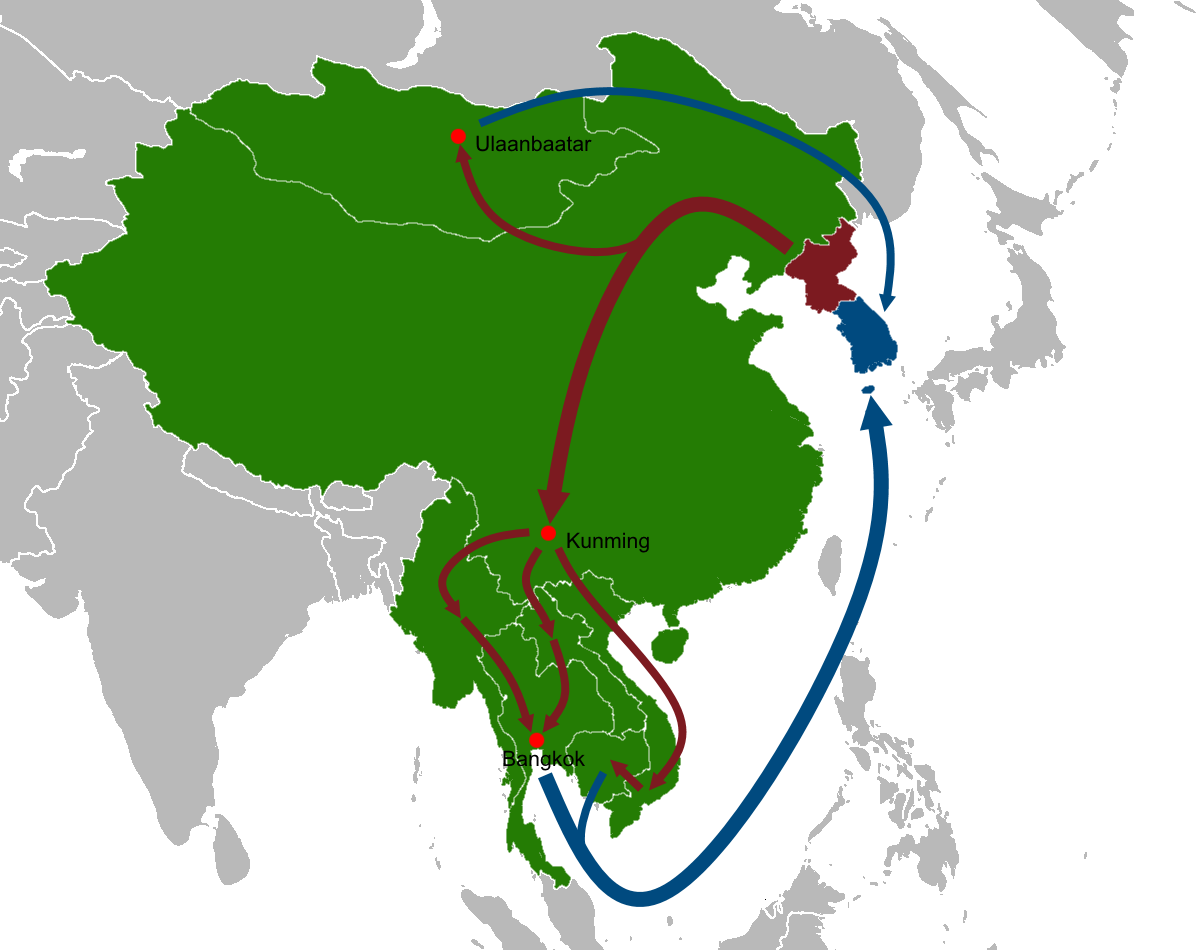|
North Korean Won
The Korean People's won, sometimes known as the North Korean won (Symbol: ₩; Code: KPW; Korean: ) or Democratic People's Republic of Korea won ( Korean: ), is the official currency of North Korea. It is subdivided into 100 ''chon''. The currency is issued by the Central Bank of the Democratic People's Republic of Korea, based in the North Korean capital city of Pyongyang. Etymology ''Won'' is a cognate of the Chinese yuan and Japanese yen. All three names derive from the Hanja (), which means "round shape." The won is subdivided into 100 chon (; ; McCune-Reischauer: ''chŏn''; Revised Romanization: ''jeon''). History 1947–2009 After the division of Korea, North Korea continued using the Korean yen for two years, until the Central Bank of the Democratic People's Republic of Korea was established on 6 December 1947 and the first North Korean won was issued. In February 1959, the second North Korean won was introduced, equal to 100 old won. From 1978 on, the N ... [...More Info...] [...Related Items...] OR: [Wikipedia] [Google] [Baidu] |
Korean Won
The Korean won ( ko, 원 (圓), ) or Korean Empire won ( Korean: 대한제국 원), was the official currency of the Korean Empire between 1902 and 1910. It was subdivided into 100 ''jeon'' (; ko, 전 (錢), ). Etymology Won is a cognate of the Chinese yuan and Japanese yen, which were both derived from the Spanish-American silver dollar. It is derived from the hanja (, ''won''), meaning "round", which describes the shape of the silver dollar. History The Korean won, Chinese yuan and Japanese yen were all derived from the Spanish-American silver dollar, a coin widely used for international trade between Asia and the Americas from the 16th to 19th centuries. On May 22, 1901 the Korean Empire adopted the gold standard in response to many other countries doing the same. The won was introduced in 1902, replacing the yang at a rate of 1 won = 10 yang. Units: 1 won = 100 jeon (錢), 1 jeon = 5 bun (分, "fun" ec. yesteryear spellings) of the preceding currency. ... [...More Info...] [...Related Items...] OR: [Wikipedia] [Google] [Baidu] |
Korean Yen
The Korean yen was the currency of Korea between 1910 and 1945. It was equivalent to the Japanese yen and consisted of Japanese currency and banknotes issued specifically for Korea. The yen was subdivided into 100 sen. It replaced the Korean won at par and was replaced by the South Korean won and the North Korean won at par. Banknotes From 1902 to 1910, banknotes were issued by . Denominations included 10 sen, 20 sen, 50 sen, 1 yen, 5 yen, and 10 yen. The sen notes were vertical and resembled the Japanese sen notes of 1872 and the Japanese military yen at the turn of the century. These notes were redeemable in "Japanese Currency at any of its Branches in Korea". In 1909, the Bank of Korea (1909) (韓國銀行) was founded in Seoul as a central bank and began issuing currency of modern type. Following the establishment of the Bank of Korea, it would immediately begin to issue its own banknotes, these new banknotes were redeemable "in gold or Nippon Ginko notes." Most ... [...More Info...] [...Related Items...] OR: [Wikipedia] [Google] [Baidu] |
The Independent
''The Independent'' is a British online newspaper. It was established in 1986 as a national morning printed paper. Nicknamed the ''Indy'', it began as a broadsheet and changed to tabloid format in 2003. The last printed edition was published on Saturday 26 March 2016, leaving only the online edition. The newspaper was controlled by Tony O'Reilly's Irish Independent News & Media from 1997 until it was sold to the Russian oligarch and former KGB Officer Alexander Lebedev in 2010. In 2017, Sultan Muhammad Abuljadayel bought a 30% stake in it. The daily edition was named National Newspaper of the Year at the 2004 British Press Awards. The website and mobile app had a combined monthly reach of 19,826,000 in 2021. History 1986 to 1990 Launched in 1986, the first issue of ''The Independent'' was published on 7 October in broadsheet format.Dennis Griffiths (ed.) ''The Encyclopedia of the British Press, 1422–1992'', London & Basingstoke: Macmillan, 1992, p. 330 It was pro ... [...More Info...] [...Related Items...] OR: [Wikipedia] [Google] [Baidu] |
Joongang Daily
''Korea JoongAng Daily'' is the English edition of the South Korean national daily newspaper ''JoongAng Ilbo''. The newspaper was first published on October 17, 2000, originally named as ''JoongAng Ilbo English Edition''. It mainly carries news and feature stories by staff reporters, and some stories translated from the Korean language newspaper. ''Korea JoongAng Daily'' is one of the three main English newspapers in South Korea along with ''The Korea Times'' and ''The Korea Herald''. The newspaper is published with a daily edition of ''The New York Times'' and it is located within the main offices of the ''JoongAng Ilbo'' in Sangam-dong, Mapo-gu, Seoul Seoul (; ; ), officially known as the Seoul Special City, is the Capital city, capital and largest metropolis of South Korea.Before 1972, Seoul was the ''de jure'' capital of the North Korea, Democratic People's Republic of Korea (North Korea .... See also * List of newspapers in South Korea References External linksOf ... [...More Info...] [...Related Items...] OR: [Wikipedia] [Google] [Baidu] |
Xinhua
Xinhua News Agency (English pronunciation: )J. C. Wells: Longman Pronunciation Dictionary, 3rd ed., for both British and American English, or New China News Agency, is the official state news agency of the People's Republic of China. Xinhua is a ministry-level institution subordinate to the State Council and is the highest ranking state media organ in China. Xinhua is a publisher as well as a news agency. Xinhua publishes in multiple languages and is a channel for the distribution of information related to the Chinese government and the ruling Chinese Communist Party (CCP). Its headquarters in Beijing are located close to the central government's headquarters at Zhongnanhai. Xinhua tailors its pro-Chinese government message to the nuances of each audience. Xinhua has faced criticism for spreading propaganda and disinformation and for criticizing people, groups, or movements critical of the Chinese government and its policies. History The predecessor to Xinhua was the ... [...More Info...] [...Related Items...] OR: [Wikipedia] [Google] [Baidu] |
Civil Unrest
Civil disorder, also known as civil disturbance, civil unrest, or social unrest is a situation arising from a mass act of civil disobedience (such as a demonstration, riot, strike, or unlawful assembly) in which law enforcement has difficulty maintaining their authority. Engagement According to the U.S. Code, a person is engaged in civil disorder if they - Causes Any number of things may cause civil disorder, whether it is a single cause or a combination of causes; however, most are born from political grievances, economic disparities, social discord, but historically have been the result of long-standing oppression by a group of people towards another. Civil disorder arising from political grievances can include a range of events, from a simple protest to a mass civil disobedience. These events can be spontaneous, but can also be planned. These events can turn violent when agitators and law enforcers overreact. Civil disorder has in history arisen from economic dispute ... [...More Info...] [...Related Items...] OR: [Wikipedia] [Google] [Baidu] |
Media Of North Korea
The mass media in North Korea is amongst the most strictly controlled in the world. The constitution nominally provides for freedom of speech and the press. However, the government routinely disregards these rights, and seeks to mold information at its source. A typical example of this was the death of Kim Jong-il, news of which was not divulged until two days after it occurred. Kim Jong-un, who replaced his father as the leader, has largely followed in the footsteps of both his grandfather, Kim Il-sung, and his father. However, new technologies are being made more freely available in the country. State- run media outlets are setting up websites, while mobile phone ownership in the country has escalated rapidly. “There is no country which monopolizes and controls successfully the internet and information as North Korea does,” said Kang Shin-sam, an expert on North Korean technology and co-head of the International Solidarity for Freedom of Information in North Korea, a nonpr ... [...More Info...] [...Related Items...] OR: [Wikipedia] [Google] [Baidu] |
The Times
''The Times'' is a British daily national newspaper based in London. It began in 1785 under the title ''The Daily Universal Register'', adopting its current name on 1 January 1788. ''The Times'' and its sister paper '' The Sunday Times'' (founded in 1821) are published by Times Newspapers, since 1981 a subsidiary of News UK, in turn wholly owned by News Corp. ''The Times'' and ''The Sunday Times'', which do not share editorial staff, were founded independently and have only had common ownership since 1966. In general, the political position of ''The Times'' is considered to be centre-right. ''The Times'' is the first newspaper to have borne that name, lending it to numerous other papers around the world, such as ''The Times of India'', ''The New York Times'', and more recently, digital-first publications such as TheTimesBlog.com (Since 2017). In countries where these other titles are popular, the newspaper is often referred to as , or as , although the newspaper is of nat ... [...More Info...] [...Related Items...] OR: [Wikipedia] [Google] [Baidu] |
The Washington Post
''The Washington Post'' (also known as the ''Post'' and, informally, ''WaPo'') is an American daily newspaper published in Washington, D.C. It is the most widely circulated newspaper within the Washington metropolitan area and has a large national audience. Daily broadsheet editions are printed for D.C., Maryland, and Virginia. The ''Post'' was founded in 1877. In its early years, it went through several owners and struggled both financially and editorially. Financier Eugene Meyer purchased it out of bankruptcy in 1933 and revived its health and reputation, work continued by his successors Katharine and Phil Graham (Meyer's daughter and son-in-law), who bought out several rival publications. The ''Post'' 1971 printing of the Pentagon Papers helped spur opposition to the Vietnam War. Subsequently, in the best-known episode in the newspaper's history, reporters Bob Woodward and Carl Bernstein led the American press's investigation into what became known as the Waterga ... [...More Info...] [...Related Items...] OR: [Wikipedia] [Google] [Baidu] |
Revaluation
Revaluation is a change in a price of a good or product, or especially of a currency, in which case it is specifically an official rise of the value of the currency in relation to a foreign currency in a fixed exchange rate system. In contrast, a devaluation is an official ''reduction'' in the value of the currency. Under floating exchange rates, a rise in a currency's value is an appreciation. Altering the face value of a currency without changing its purchasing power is a redenomination, not a revaluation (this is typically accomplished by issuing a new currency with a different, usually lower, face value and a different, usually higher, exchange rate while leaving the old currency unchanged; then the new replaces the old). In a fixed exchange rate system, the central bank maintains an officially announced exchange rate by standing ready to buy or sell foreign currency at that rate. In general terms, revaluation of a currency is a calculated adjustment to a country's official ... [...More Info...] [...Related Items...] OR: [Wikipedia] [Google] [Baidu] |
Daily NK
''Daily NK'' is an online newspaper based in Seoul, South Korea, where it reports on various aspects of North Korean society from information obtained from inside and outside of North Korea via a network of informants. North Korea is ranked 179 out of 180 in the 2021 World Press Freedom Index, which is compiled by Reporters Without Borders. The organization's president and editor-in-chief are South Korean, while its journalists are a mix of South Koreans and North Korean defectors. ''Daily NK'' is a recipient of funding from multiple institutions and private donors, including the National Endowment for Democracy, an NGO funded by the U.S. Congress. ''Daily NK''s president is Lee Kwang-baek. The amount of ''Daily NK'''s funding from the National Endowment for Democracy since 2016 is available in the public sphere. The organization is part of a consortium with thUnification Media Group which is a South Korea-based non-profit organization that produces and delivers radio con ... [...More Info...] [...Related Items...] OR: [Wikipedia] [Google] [Baidu] |
North Korean Defectors
Since the division of Korea after the end of World War II, North Koreans have fled from the country in spite of legal punishment for political, ideological, religious, economic, moral, personal, or nutritional reasons. Such North Koreans are referred to as North Korean defectors by the North Korean regime. Alternative terms in South Korea, where the defectors often end up, include "northern refugees" ( ko, 탈북자, ''talbukja'' or , ''talbukmin'') and "new settlers" (, ''saeteomin''). During the North Korean famine of the 1990s, there was an increase in defections, reaching a peak in 1998 and 1999. Some of the main reasons for the falling number of defectors, especially since 2000, are the strict border patrols and inspections, forced deportations, and the rising cost of defection. The most common strategy of North Korean defectors is to cross the Chinese border into Jilin and Liaoning provinces in northeast China. About 76% to 84% of defectors interviewed in China or S ... [...More Info...] [...Related Items...] OR: [Wikipedia] [Google] [Baidu] |


_01.jpg)




